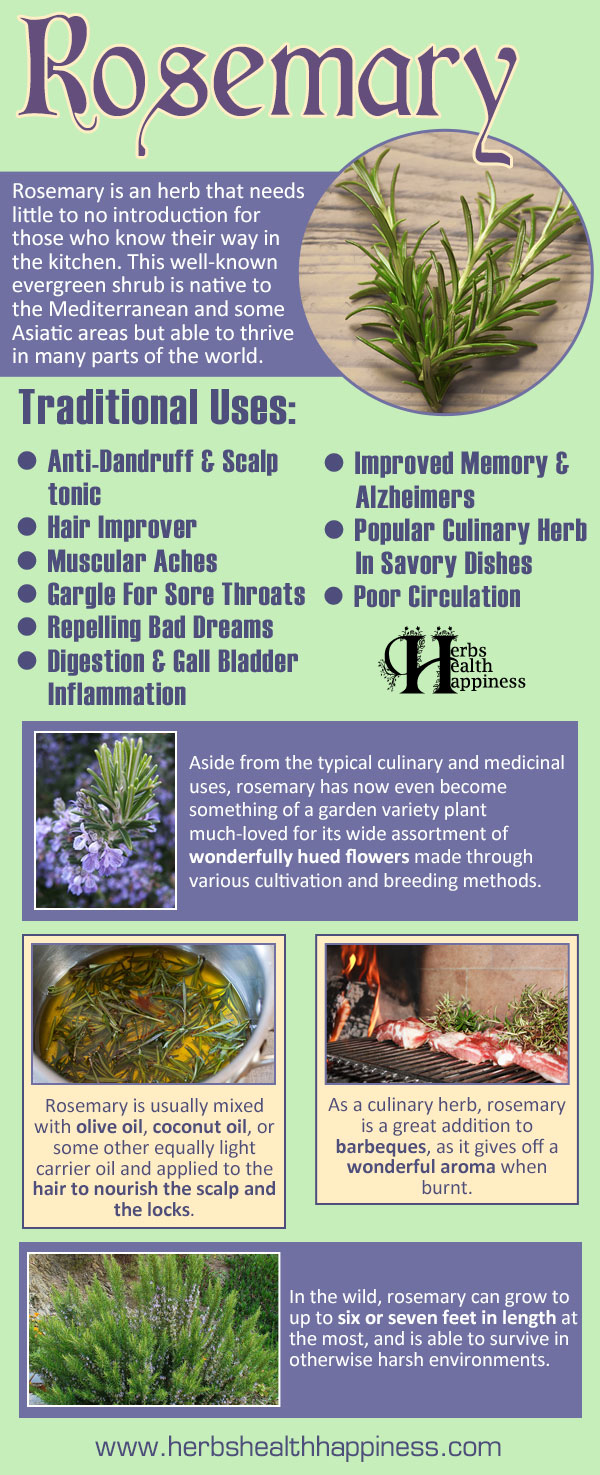Rosemary

Rosemary Uses and Benefits - image to repin / share
Infographic: herbshealthhappiness.com. Image credits: See foot of article

Rosemary - Botany And History
Rosemary is an herb that needs little to no introduction for those who know their way in the kitchen. This well-known evergreen shrub is native to the Mediterranean and some Asiatic areas but able to thrive in many parts of the world.
Rosemary is known for its ability to make savory dishes all the more appetizing. Renowned for its fragrant, somewhat earthy scent, it is a staple additive and flavour enhancer for a wide array of dishes ranging from poultry to game. Rosemary has a long-standing history in the culture, symbolism, mythology, customs, and of course – the palate of many parts of the world.
With its distinctive needle-like leaves and hardy appearance, the modest rosemary shrub is easy to grow and is a staple in many herbal gardens alongside other fragrant herbs. In the wild, rosemary can grow to up to six or seven feet in length at the most, and is able to survive in otherwise harsh environments. [1] Where rosemary thrives, it often grows as a weed, but unlike more invasive plants, it is highly prized not only as an herb used for cooking, but for its many medicinal uses as well.
While the most commonly used part of the plant is its needle-like leaves, herbal lore ascribes different medicinal benefits associated with a specific part of the plant. Aside from the typical culinary and medicinal uses, rosemary has now even become something of a garden variety plant much-loved for its wide assortment of wonderfully hued flowers made through various cultivation and breeding methods. [2]

Rosemary - Herbal Uses
Rosemary is among the most versatile of herbs, and is an excellent addition to one's private herbal pharmacopoeia, herb garden, or kitchen counter.
The most common use of rosemary is of course as a culinary herb. Common in many European dishes, rosemary is the perfect seasoning for an assortment of meats, among them lamb, chicken, beef, and many types of game. It has a long-standing reputation in many households as an indispensable herb for flavouring an array of dishes. Rosemary is a perfect addition to roast meats as well as stuffing, as it not only imbues the meat with a unique and delightful woodsy aroma, it also enhances the flavours of the meat itself. As a culinary herb, rosemary is a great addition to barbeques, as it gives off a wonderful aroma when burnt.
Medicinally, rosemary has been associated with memory since ancient times, and it has been referred to from the latter part of the Elizabethan Era to the Early Romantic period as the herb of remembrance. Because of this esoteric association, rosemary has been made into a sort of herbal-amulet, where it placed beneath pillowcases, or even smelt, and it was believed that rosemary could protect the sleeper from nightmares, as well as increase their memory through either of the two practices. [3]
An easier method to benefit from this traditional memory-enhancing herb is to either carry a sprig of rosemary to whiff every now and then, or to boil some water and to place rosemary leaves (ground or whole, ground being more potent) into the hot water and to inhale the vapours, being careful not to scald oneself. Modern research has shown that this folkloric belief is somewhat factual, as several experiments employing rosemary essential oil scents have shown that it does indeed help with memory retention. [4]
Rosemary is also commonly infused with vinegar and this may also be used for cooking - and this rosemary vinegar is common in several parts of the Mediterranean and the Adriatic. [5] It is also one of the ingredients in the ancient Four Thieves Vinegar.
Rosemary essential oil, or any oil infused with its essential oil or its parts have also been traditionally used as a remedy for muscular aches and pains, usually associated with the presence of camphor and carnosic acid found in the leaves. [6] According to the sales literature for the rosemary essential oil pictured left, Rosemary "improves dry or mature skin, eases lines and wrinkles, and heals burns and wounds. It can also clear acne, blemishes or dull dry skin by fighting bacteria and regulating oil secretions. It improves circulation and can reduce the appearance of broken capillaries and varicose veins. Rosemary helps to overcome mental fatigue and sluggishness by stimulating and strengthening the entire nervous system. It enhances mental clarity while aiding alertness and concentration. It can also help you cope with stressful conditions and see things from a clearer perspective."
When drunk as a tisane (tea), rosemary has been shown to help relieve stress and increase memory, as well as to help in keep ageing at bay. [7] Rosemary is now medically known to possess a number of potent active antioxidant compounds such as rosmarinic acid, which help fight off free-radicals. Rosemary tea recipes are commonly sold in health-food stores as memory-enhancing teas, or stress-busting teas. It can be made into a tea on its own, or mixed with real tea (camellia sinensis), usually of the green variety.
Rosemary has also been suggested for poor digestion, gall bladder inflammation, as a gargle for sore throats and for mood elevation. [8]
Rosemary For Hair
Cosmetically, rosemary, or, more frequently, its essential oils, is used as a fragrance and an additive in soaps and shampoos. Traditional cosmetology credits rosemary with thickening and darkening the hair, as well as hastening hair-growth. To this day, organic hair-care buffs consider rosemary as an essential must-have for beautifying hair, as it acts as both a thickening agent, as well as an anti-bacterial and anti-fungal medium that helps to prevent dandruff and other maladies of the scalp. Rosemary is usually mixed with olive oil, coconut oil, or some other equally light carrier oil and applied to the hair to nourish the scalp and the locks. [6] Another cosmetic practice that stemmed from culinary methods (herb infused oils were, and still are a common culinary practice) is to let rosemary sprigs macerate in cider vinegar to be used (diluted with water) as a hair-rinse to impart shine, body, and luster to hair, as well as to prevent graying hair and to ward off lice. [7]
Many modern soaps and shampoos, especially organic ones, employ the essential oil of rosemary to help improve hair-growth. It is usually combined with an assortment of other nourishing herbs for greater efficiency. Some studies have been shown to support these traditional claims, although the efficacy of rosemary essential oils for supporting hair-growth is nevertheless still considered dubious (as are many hair growth / restoration formulas) by the greater body of medical experts. [8] Hair oils (usually common in India) also employ rosemary leaves or its essential oil for the prevention of scalp-related maladies, as well as for hair-growth, hair-thickening, and darkening.
Rosemary may also simply be boiled with water, and the cooled decoction may be used as a final rinse after shampooing to help darken and thicken hair.
Rosemary - Esoteric Uses
Less well-known uses for rosemary include it being burnt as an incense, usually to help in memory enhancement, to ward off spirits or malevolent entities or simply for its aroma. Rosemary, when ground into a semi-fine state can also be smoked in either pipes or cigarettes, by itself, or else blended with tobacco or other smokable herbs. [12] Smoking rosemary does not result in a 'buzz' as is commonly thought, but it may cause headaches and a dryness of the mouth and throat if smoked overmuch.
In esoteric practices, rosemary was traditionally used as a stuffing for poppets (cloth-dolls) and employed to attract lovers, money, or health. [13] It is considered one of many 'protective' herbs, which is why it is used as incense for cleansing and warding, as well as sewn into pouches that are hung outside doors, or placed beneath pillows or mattresses. [13] Growing rosemary sprigs outdoors was also traditionally thought to ward off witches and other malevolent entities, while the old custom of placing a sprig of rosemary on the coffin of a recently departed person served not only as an act of remembrance, but also to prevent the person from becoming one of the undead. [14]
Names of Rosemary, Past and Present
Greek: anthos (lit. 'flower')
English: rosemary ('rose of the sea' / 'rose of [the Virgin] Mary')
Spanish / Filipino: romero (lit. 'rose of the sea')
Latin (scientific nomenclature): Rosmarinus officinalis ('dew of the sea')
References:
[1] https://www.food.com/library/rosemary-340
[2] https://en.wikipedia.org/wiki/Rosemary
[3] https://botanical.com/botanical/mgmh/r/rosema17.html
[4] https://informahealthcare.com/doi/abs/10.1080/00207450390161903
[5] https://en.wikipedia.org/wiki/Four_Thieves_Vinegar
[6] https://www.nutrition-and-you.com/rosemary-herb.html
[7] https://www.ncbi.nlm.nih.gov/pubmed/10937349
[8] https://www.naturalnews.com/032781_rosemary_hair.html
[9] https://www.herbal-supplement-resource.com/rosemary-herb.html
[10] https://www.anniesremedy.com/chart_remedy.php?oil_ID=51
[11] https://www.umm.edu/altmed/articles/rosemary-000271.htm
[12] https://www.metro.co.uk/news/145515-live-to-100-by-smoking-rosemary
[13] https://aromaticamedica.tripod.com/id23.html
[14] https://windspirit57.tripod.com/id4.html
Main article researched and created by Alexander Leonhardt,
© herbshealthhappiness.com
Infographic Image Sources:
Pixabay (PD)
https://commons.wikimedia.org/wiki/File:Rosmarinus_officinalis133095382.jpg
https://commons.wikimedia.org/wiki/File:Olive_Oil_Infused_Rosemary_(5551701707).jpg
https://commons.wikimedia.org/wiki/File:Rosmarinus_officinalis_0001.JPG
(Creative Commons)
![]()

![]()

1. Famous Chef Sheds 60lbs Researching New Paleo Recipes: Get The Cookbook FREE Here
2. #1 muscle that eliminates joint and back pain, anxiety and looking fat
3. Drink THIS first thing in the morning (3 major benefits)
4. [PROOF] Reverse Diabetes with a "Pancreas Jumpstart"
5. Why Some People LOOK Fat that Aren't
6. Amazing Secret Techniques To Protect Your Home From Thieves, Looters And Thugs
7. The #1 WORST food that CAUSES Faster Aging (beware -- Are you eating this?)
If you enjoyed this page:


























